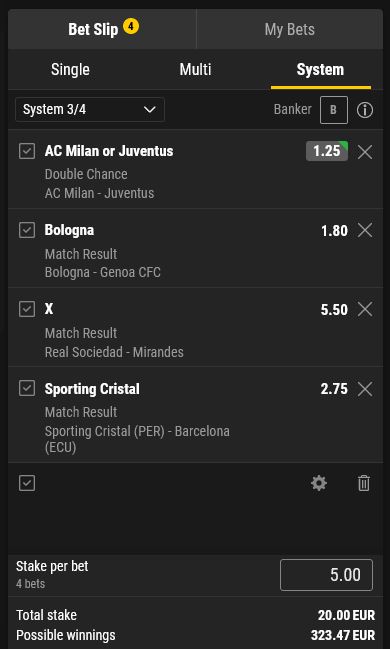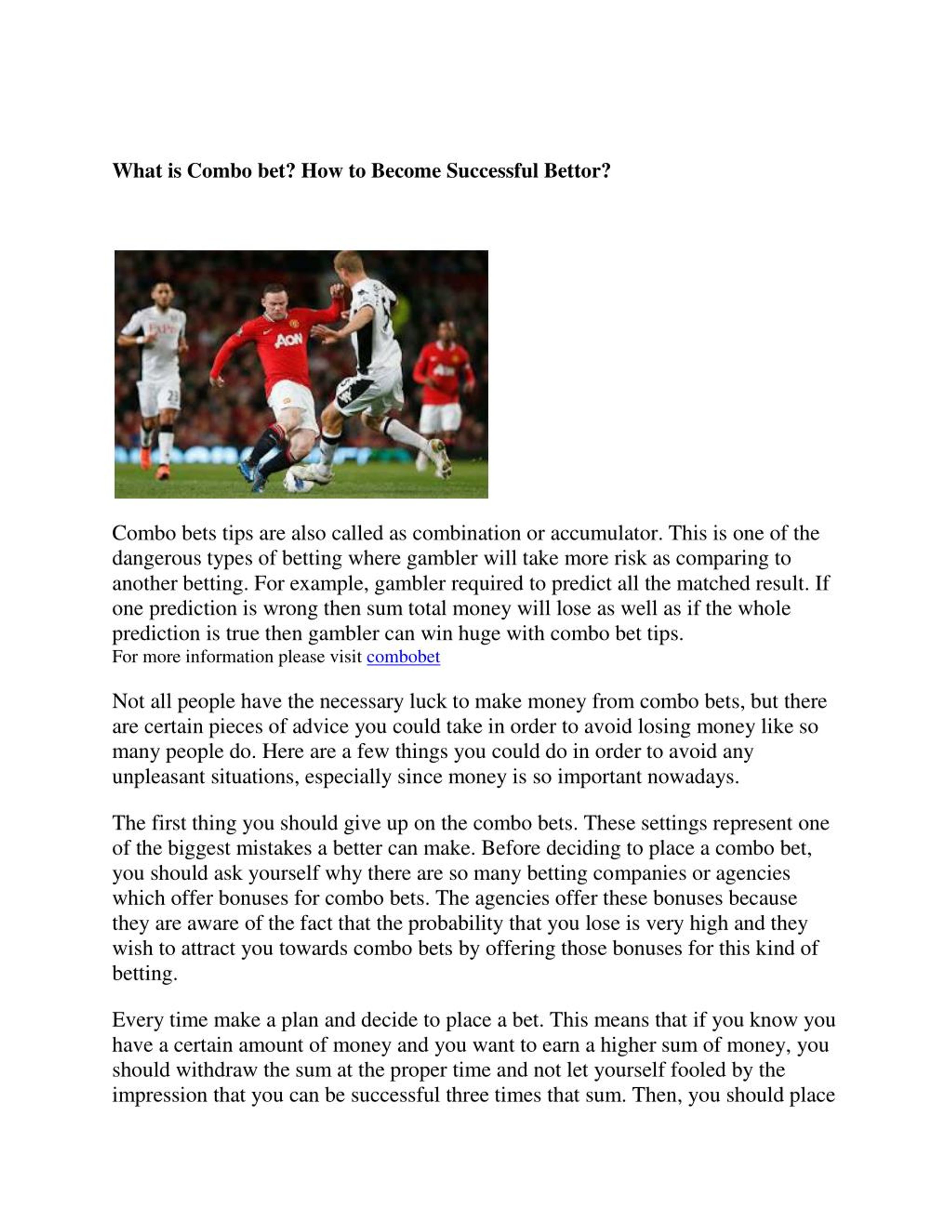What Is Combo Bet
Posted By admin On 02/08/22
Playing the Pick 3 games in your state lottery can be highly profitable. It takes winning consistently and it takes a strategy to play effectively.
Combination bets can include both singles and various types of multiple bets, including doubles, trebles and accumulators, which consist of four or more bets. In addition, many bookmakers offer. COMBO: Choose three single-digit numbers from 0 to 9. Your ticket will automatically play those numbers in all possible number combinations, all on one ticket. Match one of the combinations to the three numbers drawn by the Lottery EXACTLY to win.
The thing that has always amazed me is how some players ignore the potential profits that lie within the Pick 3 type games. Millions of people don’t think twice about laying out $20 worth of bets on the big lotto games that hold odds of almost 14 million to 1 against them. Most of those players have never won a significant jackpot in those games.
The daily games offer much better odds and a much more realistic chance of winning. In most states a $1 straight win is worth a $500 payout. Most states draw the Pick 3 game once during the day, and once in the evening. That can mean 14 opportunities a week to win. How many times a week do you need to win $500 before it makes a difference in your life?
The potential to win good money in the Pick 3 exists. As I said a minute ago, it just requires playing consistently, and playing with a good strategy.
A major part of a good strategy is the method of betting used when playing your picks. Let’s first take a look at the various types of betting that take place in the Pick 3 games.
There are basically three types of bets made in the Pick 3. You can place a box bet, a straight bet, or a combination bet. Some states refer to the box bet as an “any order” bet, and the straight bet as an “exact” bet.
Front & Back Pair Bets

Sportsbook Betting Offers
View Offers- £25
- £50
Combination betting refers to the practice of placing multiple bets on a series of selections in order to reduce risk and maximise potential gain. Unlike an accumulator (parlay) or single bet, it does not fail if a single selection is wrong.
Take, for example, a typical Thoroughbred flat race meeting, with six races scheduled on a single day and a bettor who has £12 with which to wager. If one straight bet of £12 is made on a single horse to Win in the first race, no matter what the odds, all is lost if the selection fails to come in first, making for a very short afternoon of wagering.
Alternatively, the bettor might choose to place £4 wagers on selected horses to Win in each of the first three races, for a total stake of £12—a so-called “combination bet” made up of three singles. If at least one of the selections succeeds at odds of higher than 3/1, the betting will pay a profit. Similarly, two winners at average odds of above 2/3 would also yield a profit, and if all three win, it will be a happy day at the races indeed.
In this case, combination betting has reduced the risk. One or two losers will not necessarily cause all of the wagering to fail. The risk could be further reduced by staking £2 apiece on horses in each of the six races. A single winner paying better than 6/1 odds would ensure a profitable day.
The drawback, of course, is that the possibility of winning big is reduced when the bets are spread around in this way. Unless several selections are correct, only a small profit is returned.
With the appeal of long odds in mind, bookmakers offer “accumulators,” joining two or more selections into a single wager at greater odds than would be returned if they were bet upon individually. What’s more, the minimum cost of the accumulator is lower than that of making individual bets. The risk, of course, is that if a single selection fails, the entire stake is lost.
Two selections wagered on together are called a “double.” Three selections taken as a unit are called a “treble.” Accumulators of four, five or six selections are known as “four-fold,” “five-fold” and “six-fold” accumulators, respectively.
Here’s where combination betting shows its true advantage. It allows a singles, doubles, trebles and other accumulators to be wagered upon as group. One of the most popular combination bets is a “Trixie.” It consists of four wagers on three selections in different events, including three doubles and one treble—AB, AC, BC and ABC. If at least two of the selections succeed, the bettor will receive a return.
In much the same way, a “Yankee” allows four selections in different events to be fully covered using eleven wagers. It includes six doubles, four trebles and an accumulator—AB, AC, AD, BC, BD, CD, ABC, ABD, ACD, BCD and ABCD. Again, if at least two of the selections succeed, a return is guaranteed.
Much more complex combination betting can be pursued. The “Super Yankee” or so-called “Canadian” is made up of 26 wagers on five selections in different events. It includes ten doubles, ten trebles, five four-fold accumulators and one five-fold accumulator. At least two of the selections must succeed to receive a return.
The combination bet known as a “Heinz” covers six selections with 57 separate bets—15 doubles, 20 trebles, 15 four-fold accumulators, 6 five-fold accumulators and one six-fold accumulator. The “Super Heinz” is made up of 120 bets covering seven selections in different events. It consists of 21 doubles, 35 trebles, 35 four-fold accumulators, 21 five-fold accumulators, seven six-fold accumulators and one seven-fold accumulator. In both instances, at least two selections must succeed in order for a return to be received.
The “Goliath” consists of 247 bets. It covers eight selections in different events with 28 doubles, 56 trebles, 70 four-fold accumulators, 56 five-fold accumulators, 28 six-fold accumulators, eight seven-fold accumulators and one eight-fold accumulator. At least two selections must succeed in order for a return to be received.
When combination bets include all possible combinations of doubles, trebles and accumulators for a given number of selections, such as those named above, they are referred to collectively as “full cover bets.” When they also include all possible singles, they are known as “full cover bets with singles.”
Published on: 28/06/2011
Related Articles
Live Betting - Winning with In-Running Sports Bets Spread Betting
Spread BettingWhy Compare Betting Odds?
Asian Handicap Betting
Introduction to Financial Spread Betting
What are Rule 4 Deductions?
Top Betting Mistakes

What is an Accumulator Bet?
Back/Lay Betting Arbitrage
What is Combination Betting?

See More Results
What is Parlay Betting
What Are Forecasts?
Full Cover Bet Explained
Full Cover Bets with Singles
How to Hedge a Bet